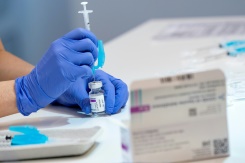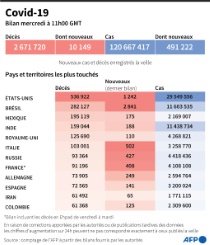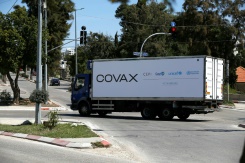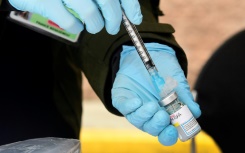The WHO recommended Wednesday to continue using AstraZeneca’s anti-Covid vaccine, the use of which has been suspended by several countries due to possible side effects, also recommending that of the American laboratory Johnson & Johnson.
“For the moment, the WHO believes that the risk / benefit balance tilts in favor of the AstraZeneca vaccine and recommends that the vaccinations continue”, indicates a press release from the UN agency, which ensures that it will continue its assessments of the health problems encountered. by some people vaccinated with this product.
After approving it on Friday, the WHO also recommended the administration of another viral vector vaccine, that of the American laboratory Johnson & Johnson, even in countries where the more contagious variants of the coronavirus circulate.
Faced with uncertainties and fears over the safety of Swedish-British AstraZenaca’s vaccine, British Minister of Health Matt Hancock called on Wednesday to continue its deployment.
“There is no evidence that these vaccines caused clots,” Matt Hancock wrote in The Sun tabloid, stressing that this is not just his opinion but that of the UK regulator, the MHRA, of the WHO and the European Medicines Agency (EMA).

But Spanish health authorities have announced that they are investigating three cases of people who suffered from blood clots after the AstraZeneca vaccine was administered, one of whom died.
– Bring back confidence –
In an attempt to restore confidence in this product which, according to an Elabe poll, is only considered reliable by 22% of French people, French Prime Minister Jean Castex said on Tuesday evening he was ready to be injected “very quickly “as soon as it is authorized again.

Jean Castex clearly suggested that a reconfinement, the weekend or over the whole week, could be decided for the 12 million inhabitants of Paris and its region, the most populous in France, faced with an acceleration of the pandemic.
The head of state Emmanuel Macron must decide on this measure, already applied at the weekend in several other regions. An announcement is expected Thursday.
While it is in the grip of a shortage of vaccines, Europe threatened Wednesday, via the European Commission, to tighten the conditions of export outside the EU of anti-Covid vaccines in order to guarantee the “reciprocity” of exchanges with countries which produce them themselves, calling in particular on the United Kingdom to send doses to the continent.
Seven European states, including Germany and France, extended the list at the start of the week to around fifteen countries having suspended the administration of the AstraZeneca vaccine following problems, such as difficulties in coagulating or training clots.
– Covax in Palestine –
But Australia on Wednesday asked AstraZeneca and the EU for emergency access to a million doses of the vaccine it has purchased in order to deliver them to Papua New Guinea, facing a Covid surge. -19.
Italy had blocked in early March a delivery of AstraZeneca vaccines produced on European soil and intended for Australia. Rome justified this measure by citing “the persistent shortage of vaccines and delays in supply from AstraZeneca” in the EU and Italy.
Palestinians on Wednesday received their first shipment of coronavirus vaccines from the Covax device intended for underprivileged regions.

Some 60,000 doses of Pfizer / BioNTech and AstraZeneca vaccines allocated to Palestinians have arrived at Ben-Gurion Airport in Tel Aviv, according to an Israeli security source.
The American laboratory Moderna has meanwhile indicated that it has started trials of its vaccine on thousands of children aged 6 months to 11 years, a clinical trial involving a planned total of 6,750 children in the United States and Canada.
– No St. Patrick’s Day –
A year after the first confinement, Ireland canceled for the second year in a row the celebrations of St. Patrick’s Day, usually frenzied.

“It’s been a year now and it feels like we’ve come back to where we started,” laments Tom Cleary, owner of a hopelessly empty Dublin pub, where only a few empty barrels lie on the icy ground.
“It’s sad that there is no end in sight,” he told AFP. “Will we have the same problems the next St. Patrick’s Day?” He wonders.
Faced with a deterioration in the health situation, the Philippines will temporarily close its borders to foreigners and reduce the number of their nationals authorized to enter the country, due to an upsurge in contamination in the archipelago. And Poland has decreed, for the same reason, a partial confinement of its population.
Iraq for its part recorded on Wednesday 5,663 new cases, an unprecedented record in the country which hosted Pope Francis almost two weeks ago in the midst of crowds, small but despite everything compact, and where the wearing of a mask is rare. .
The pandemic has killed at least 2,671,720 worldwide since the WHO office in China reported the onset of the disease at the end of December 2019, according to a report established by AFP on Wednesday.
–
© 2021 AFP. All rights of reproduction and representation reserved. All the information reproduced in this section (dispatches, photos, logos) are protected by intellectual property rights held by AFP. Consequently, none of this information may be reproduced, modified, redistributed, translated, commercially exploited or reused in any way whatsoever without the prior written consent of AFP.

